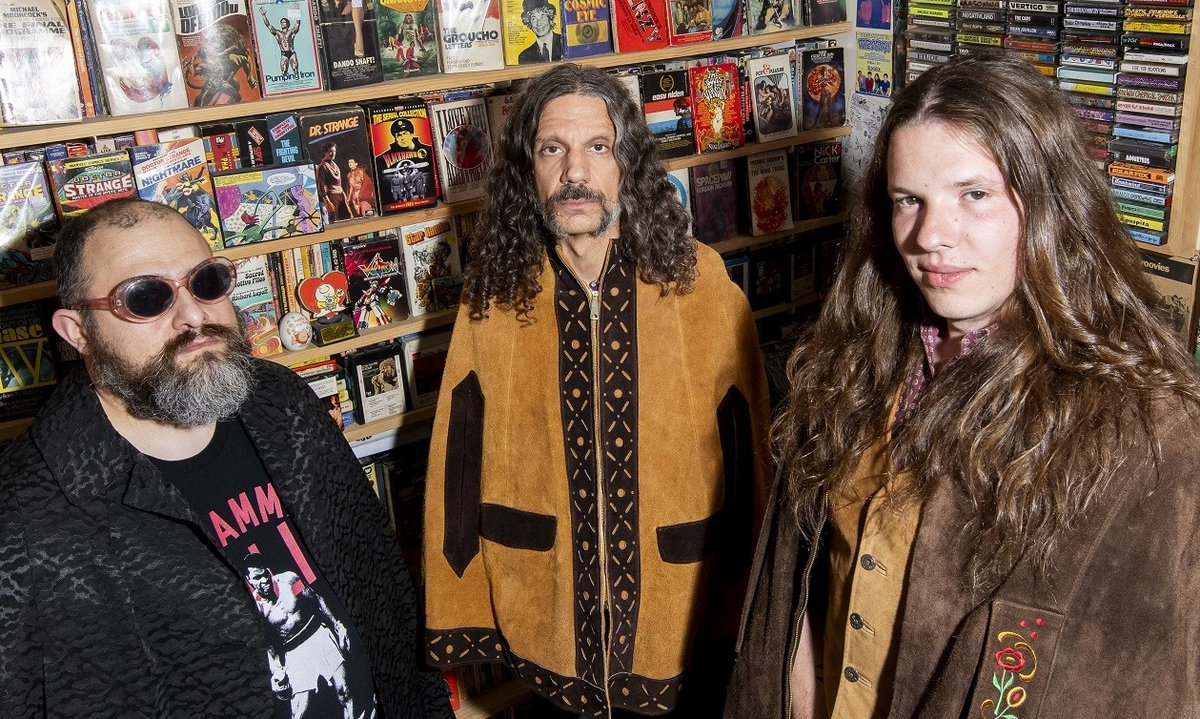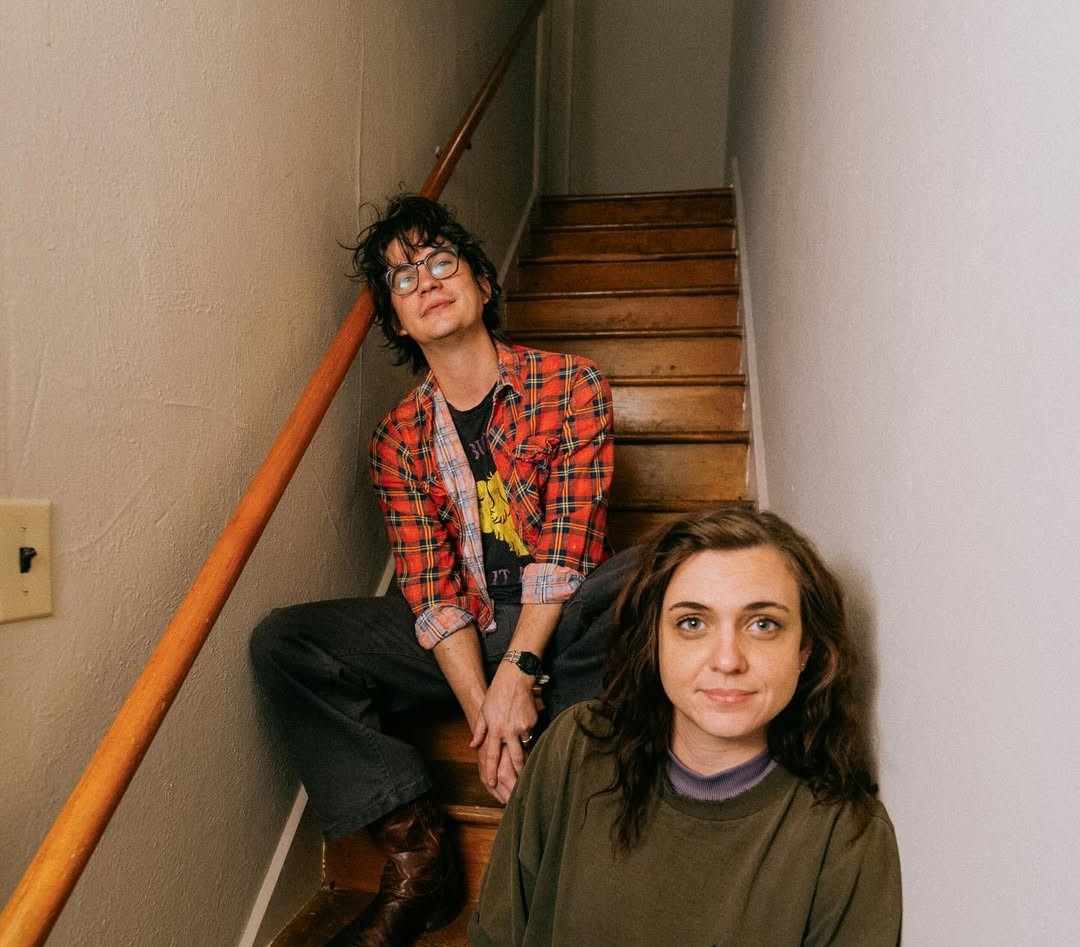‘Tales of the Golden Skull’ by Plastic Crimewave Syndicate | Interview & Album Premiere
Exclusive album premiere of ‘Tales of the Golden Skull’ by Plastic Crimewave Syndicate, set for release on November 8th, 2024, via Cardinal Fuzz (Europe) and Feeding Tube Records (USA).
The new album has this strange feeling of being stuck in the past and racing toward the future at the same time, like standing on a street corner, watching the world blur by while the record spins in your head. There’s no pretense here—just people who’ve lived through the mess of it all, somehow turning it into something that feels like hope and doom in the same breath. The chemistry between the players is palpable, not forced, just raw energy flowing from one moment to the next.
It’s messy in the best way, like finding treasure in the back of a junk shop, bits of brilliance wedged between the wreckage. No need to explain it, really—you just have to let it hit you. And if you’re lucky, it’ll stick with you long after the needle lifts.
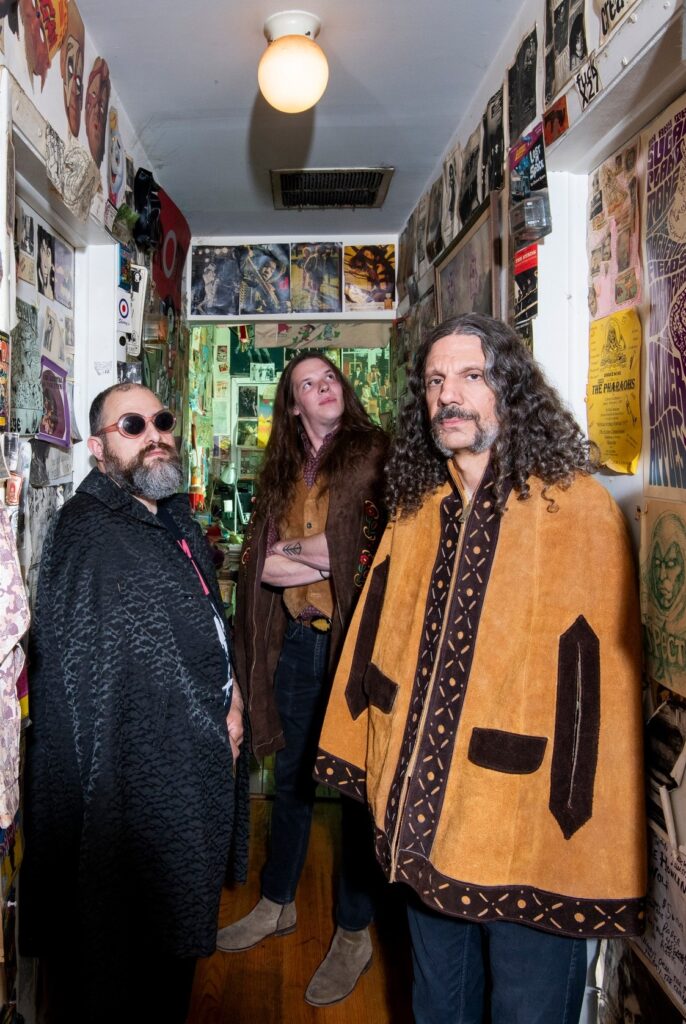
“The best concept LPs in my mind address the past, present, and future”
The album’s got this scuzzy, spaced-out heartbeat but feels like it’s hitting every corner of the galaxy—how did you land on the mix of sounds for ‘Tales From the Golden Skull’? Did you find the songs evolving into this sonic constellation naturally, or was it more like wrangling chaos into the shape you wanted?
Steven Krakow: On a basic level, these are indeed songs we developed for our live set since recording our last LP a few years ago. Most started with a simple idea, beat, or chord progression, and developed over time, slowly finding their own arrangements (“chaos wrangling” for us, ha). This incarnation of Plastic Crimewave Syndicate, with longtime drummer Jose Bernal and bassist Rob Rodak (of Dead Feathers, who joined in 2019), has also found the “musical telepathy” I strive for. Understanding and listening to each other musically and as people makes it easy to explore and ride the sonic waves with these boys, allowing for improvisation and the ability to have these moments of absolute congruence.
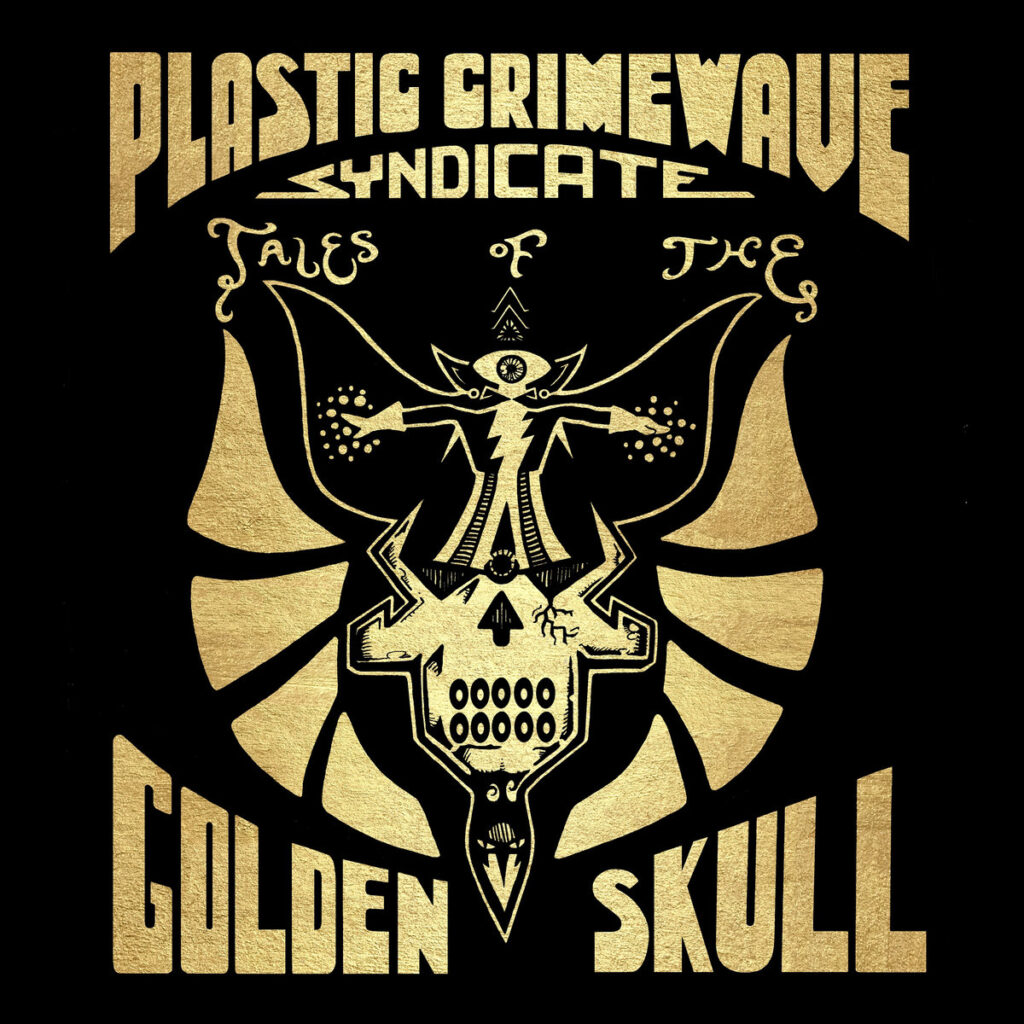
This album seems as much a tribute to past friends and collaborators as it does a step into a future vision—how did those memories shape the sound and direction of Tales From the Golden Skull? Is there one person or memory that felt especially present in the making of it?
A big inspiration was my pal and old producer Joe “Butterfly Child” Cassidy, an amazing talent, mentor, and human. Cassidy produced the first LPs by my old band Plastic Crimewave Sound over 20 years ago and passed in July of 2021. At Cassidy’s memorial, the current PCWSyndicate lineup performed a song Joe produced on the first 2003 PCWSound LP, ‘Flashing Open,’ a track called ‘Caged Fire Theme.’ It’s a space-biker anthem Julian Cope loved/compiled in the day, and I dug the way the current band rocked it out. So, as a tribute to Joe, we laid it down on ‘Tales From the Golden Skull’ as ‘Caged Fire Rides Again,’ with some new gusto and textures. I like to think of it as a “sequel” in cinematic terms, as I always imagined the tune on some imaginary ’70s biker film soundtrack. The end cut on the new LP, ‘Perfect Glass Can’ticle,’ also alludes to that same first PCWSound LP. The ditty grew out of a mellow jam between Rob and me before Jose arrived for practice. He then added some atmospheric percussion, and we suddenly had this surprisingly mellow, near-goth/post-punky lament (hey, I love the Cure and Durutti Column too, okay?). It later hit me that the “reverbed riff” I developed for it was a bit like a tune called “Perfect Glass Orchards” on that first PCWSound LP. At that time, a guitarist named Cat Chow was in the band, who passed during the pandemic in Paris, sadly unbeknownst to me until years later, which is something I struggled with a lot. Ironically, “…Orchards” was the one song the aforementioned Mr. Cope HATED off the ‘Flashing Open’ album and would not post on his site (!) but he gave the album a loving review and linkage otherwise. Anyhow, I felt Cat was instrumental to that similar song, as she had this spindly, note-y style of playing, so I thought it would be a nice tribute/elegy/canticle and album capper.
PCWS has always toyed with that “Big Muff” howl and that feral energy, but there are moments here that reach into these darker valleys and mellow, hypnotic spaces. Was that a conscious shift, or just a result of where your head was at during the recording? How do you approach these quieter, more layered moments differently from the raw riffs and chaos?
We get compared to bands like Loop, Chrome, Acid Mother’s Temple, and Hawkwind a lot (and oddly have opened for all of them, ha). If one dwells on it, those bands are very multifaceted and delved into a lot of genres while “sticking to their weirdo story.” Chrome’s soundtrack work, AMT’s lilting slow-burners like ‘Pink Lady Lemonade,’ and Hawkwind’s forays into glam, synth-pop, acoustic folk, poetry, string sections, etc., might not be what they are mostly known for, but these bands all kept their oft-two-chord fuzz-blastage while evolving. That said, everyone in this band likes different forms of music: Jose is deep into elemental blues and jazz, Rob is not afraid to get funky/soulful, and I dig everything from complex prog and no wave punk to new age and old country. We all have large-encompassing tastes to throw in the sonic stew, basically (and yes, we all dig the Pink Fairies and Guru Guru too).
I also came up musically in the ’90s, where the power of the right pedal combo was in full display via shoegaze, grunge/punk/hardcore, and avant Japanese underground bands, and I saw them all (from Nirvana to MBV to Fushitsusha). Despite the muff-ian barrage, these sonic tools can really be used to build dynamics. I mean, the OGs, bands like Sabbath/VU/Les Rallizes, were really dynamic bands, and could go from pin-drop silence to the heaviest noise/riffage you could imagine, yet could drone/trance out too. So, it’s natural to explore different musical spaces while also sticking to our derangement-of-the-senses scree. I guess going back to Hawkwind, I think of ‘Doremi Fasol Latido’ (my gateway into the band at age 19) as this perfect sonic peak, I think—it nicely harkens back to the band’s early freakout days, while refining their sound into something leaner, more ominous/less “hippie psych” in the process—plus with some of their strongest hooks/songs.
This lineup is a force of nature, pulling in synths, Moog keytar, horns—it’s an arsenal. What was the dynamic like working with players like Mac Blackout, Przemysław Krys Drazek, and Bil Vermette? Did they bring anything out in your own playing that surprised you, or was it more about layering everyone’s specific vibe into a larger piece?
Recording in an actual studio (and a good one) was a huge factor for this album and in enlisting guests. Our last, Space Alley, was literally recorded in an alley during the pandemic (thank you, Hideout) by the same engineer, Eric Block (who has worked with Steve Shelley of Sonic Youth and Rhys Chatham). It magically worked out in that alley, tracking everything in a single day, and we mixed/overdubbed some of it much later in Eric’s studio, which is where we laid down everything this time. The old-school studio, Rec Room (which has a lot of amazing history and vibes), enabled us to really spread out, experiment (“Hey Rob, try out that wah bass pedal!” “Jose, grab those bongos!”), so it took a year to record ‘Tales of the Golden Skull.’
The studio setting also allowed us to bring in a lot of great artists as “sessioners” (we won’t belittle them by calling them that) that we’d been collaborating with for live shows. These guests already had great ideas, textures, and lines they had developed in past rehearsals and gigs (we like having guest electronics, horns, etc., players live; it’s fun!). We also had the luxury of moving some bits around in the studio, like say, Drazek’s trumpet, to create some true “horn arrangements.” Mac is a visionary who completely crafted/recorded his parts painstakingly at home, while MacLean’s Moog keytar sounded particularly great on a rocker we did live (transforming it into more of a “synth-punk” thing), so I absolutely forced him to repeat this great bleepy key-line he had, ha. Bil V has been at it since the ’70s and is an atmospherics maestro (we had him on our past ‘Thunderbolt of Flaming Wisdom’ LP), so he just did his thing, direct into the studio board. Mixing all the MANY layers was a challenge (and limited time/budget), but fun and gratifying in the end, for what I hope creates a many-hued album.
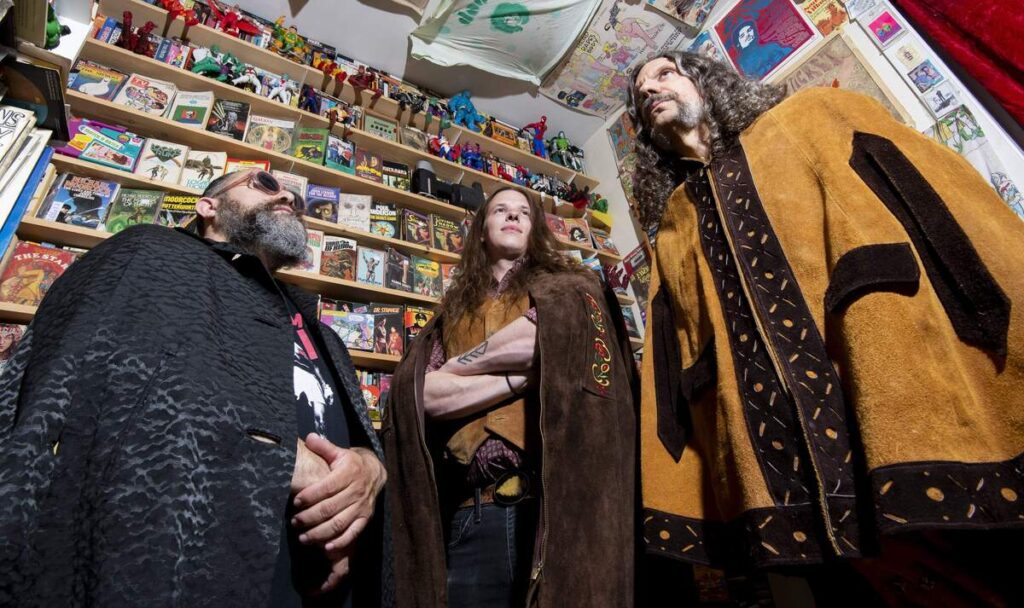
“It’s just inevitable for our surroundings to influence us, so I will never quite be singing about flowers and elves”
With such a cosmic concept album, you’re almost entering sci-fi territory. When you think of the album’s “golden future,” what do you see? Are you pulling from real experiences, or is it more of a mythological, far-out place you’re imagining?
The best “concept” LPs, in my mind, address the past, present, and future (‘Forever Changes,’ anyone?), intermingle fantasy and reality—and are usually pretty loose concepts that often reveal themselves over time. I guess the term “golden” is a theme in itself for me, with some history. An early band of mine, the Unshown, had an unreleased album called ‘The Golden Curse,’ and PCWSyndicate’s first cassette-only album was titled ‘The Golden Cage.’ Both of these alluded to the duality of life, a la a curse that is somehow coveted or a prison that is gilded with riches you can’t spend or enjoy. This time, it also refers to a certain aging bandleader hitting 50, the “golden birthday,” complete with, yes, a cracking skull on the cover, as this old boy feels the years! Ha… and yes, this milestone has me feeling introspective, along with the passing of old bandmates and cohorts. (I also just wrote a loose autobiography called A Mind Blown Is a Mind Shown for Far West Press, which really had me past-dwelling and ruminating.)
The album starts with the revisiting of ‘Caged Fire Rides Again’ aka the ‘golden’ past (it was, in some ways), continues on with ‘(Don’t Wanna) Feel,’ which was a mopier song written in the pandemic about reconnecting with angsty young depression (yay), then ‘Mind Star’ kinda surges forward to the “turning on/empowered” part of my life (when I loooooooved Detroit-style proto-punkin). The title track/end of side two leaves off in the present, and this freak-funkier direction the band has been going, as we all love stuff like Can and Funkadelic (and this rhythm section can do it!)—and I am currently VERY enamored with “weirder horn rock” like Manfred Mann Chapter 3, If, Lighthouse, and good ol’ CTA. The second side moves into the future, with the chugging ‘Atomic Ohr,’ which attempts to move always forward, blurry-eyed, into the cosmos—like yeah, the great kraut/motorik bands did. The slow-burning ‘The Killer Skies’ is a reference to conflicted anti-hero Enemy Ace, about the horrors of war, an eternal theme that humanity is clearly doomed to repeat time and time again. Musically, it also feels like another new direction PCWS is going in, with more build/release subtleties, as it’s just fun, satisfying, and cathartic to play live. These last two tracks show both the “golden” and tarnished views of the future (yes, I do love dystopian sci-fi), and it’s capped off with the short, mellow ‘Glass Orchard Can’ticle’ track, which many concept LPs utilize, from SF Sorrow to the side 2 suite on ‘New & Improved.’ This tribute-to-the-fallen bookend nods back to the opening track’s RIP sentiment, and the golden circle is unbroken.
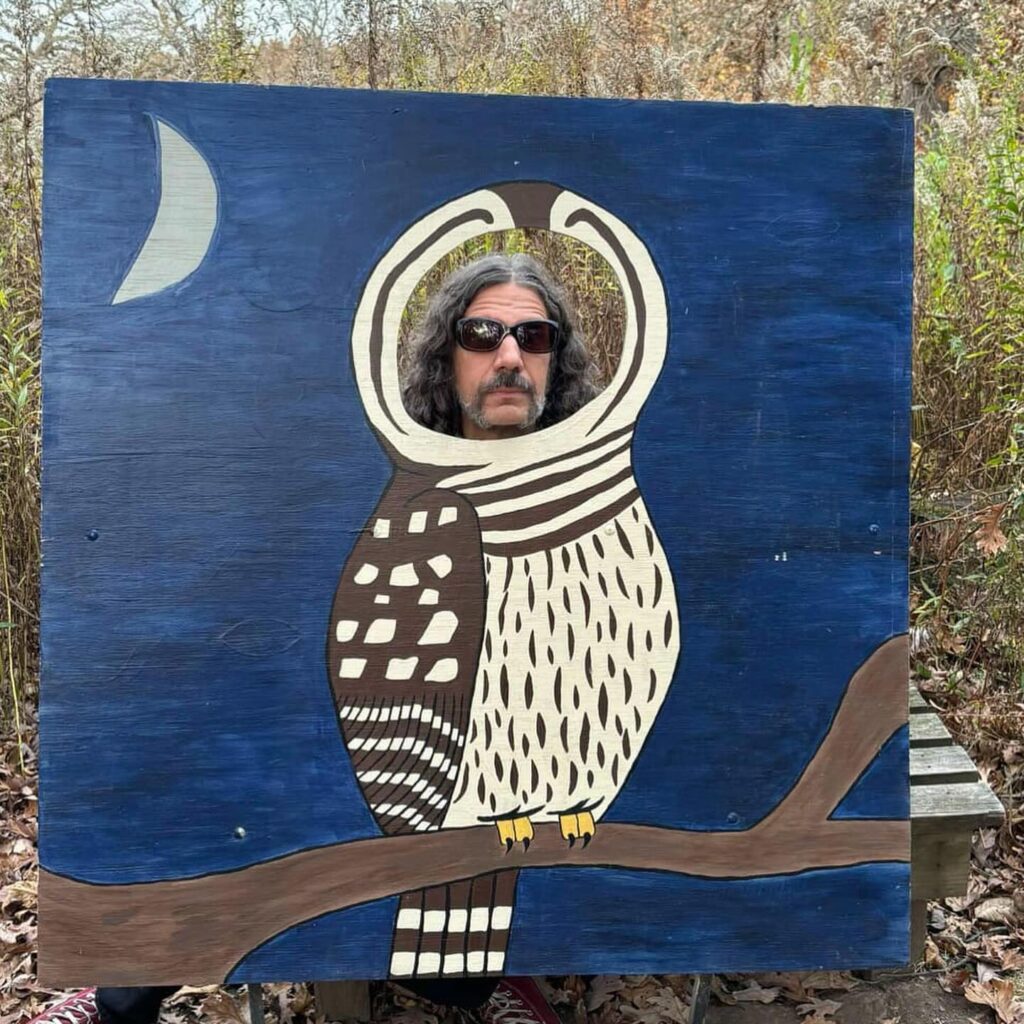
There’s a lineup here that spans decades of Chicago’s underground scene, from synthlords to heavy hitters in the post-punk and jazz worlds. How do you see ‘Tales From the Golden Skull’ fitting into the broader Chicago underground tapestry, and how did the city’s grit and personality shape this album?
It’s just inevitable for our surroundings to influence us, so I will never quite be singing about flowers and elves, haha. Chicago is not the war zone people think it is, but it is definitely a very real and gritty city at times, needless to say. I witness violence, heartbreak, poverty, madness, injustices, etc., everywhere I go (and freezing cold for 6 months out of the year, a good time to work on albums). That said, there is this amazing musical camaraderie, where jazzers, folksters, psychsters, avant knob twiddlers, etc., all interact, have varying-style projects together, and support each other—making it all one big, non-pretentious “scene.” No one puts on airs of coolness here, as we’re not the trendy coasts. People are down to earth and ready to cut loose and space-rock—and don’t mind some apocalyptic vibes in the stew, BECAUSE WE’VE ALL SEEN IT! That said, I believe music is magic and sacred, so I hope we can elevate as well—and I hope this is present in our sound, shows, and new album.
Klemen Breznikar
Headline photo: Rob Karlic
Plastic Crimewave Syndicate Official Website / Facebook / Instagram / Bandcamp
Cardinal Fuzz Facebook / Instagram / X / Bandcamp
Feeding Tube Records Official Website / Facebook / Instagram / X / Bandcamp
An interview with Plastic Crimewave also known as Steven Krakow

